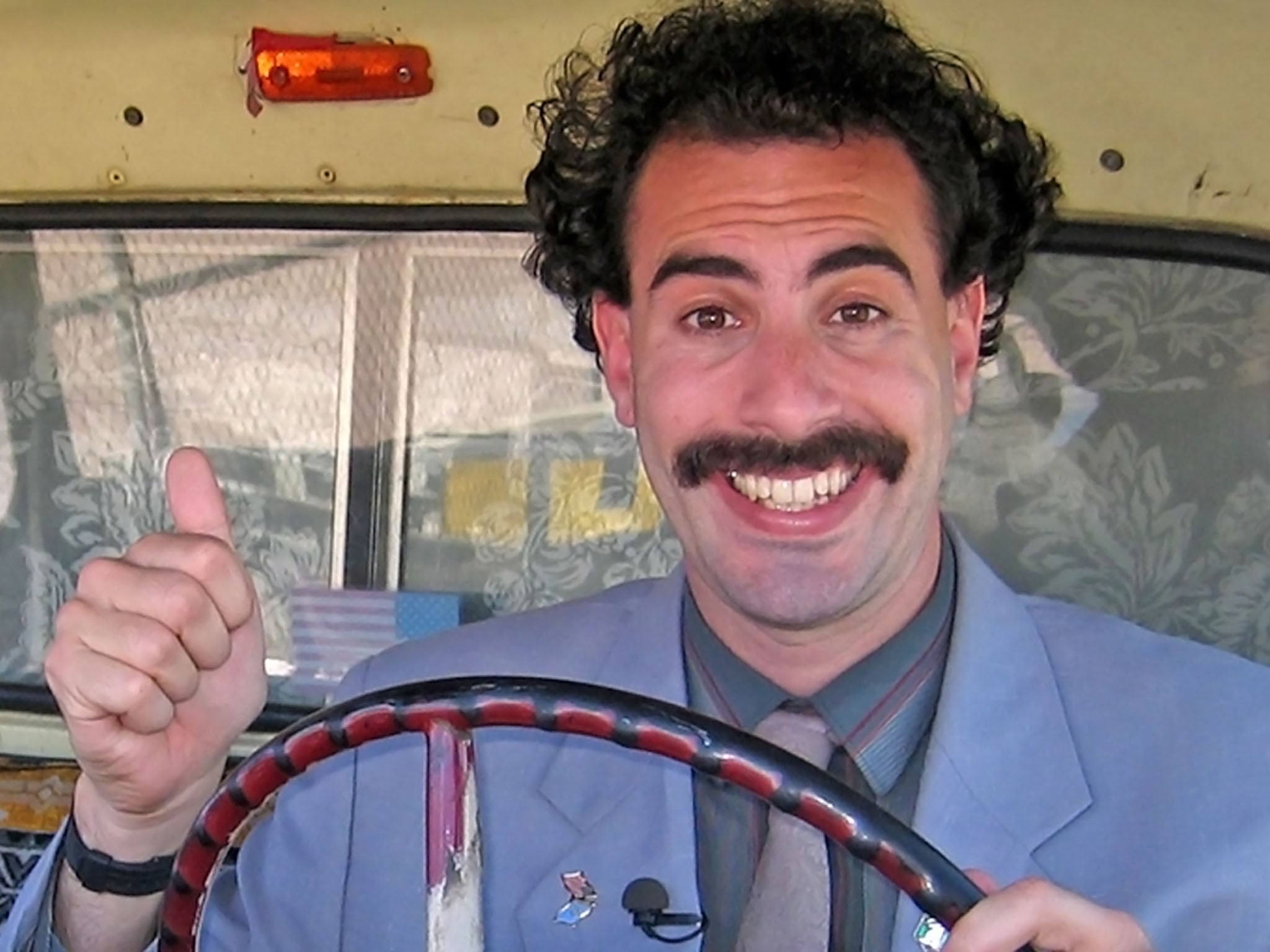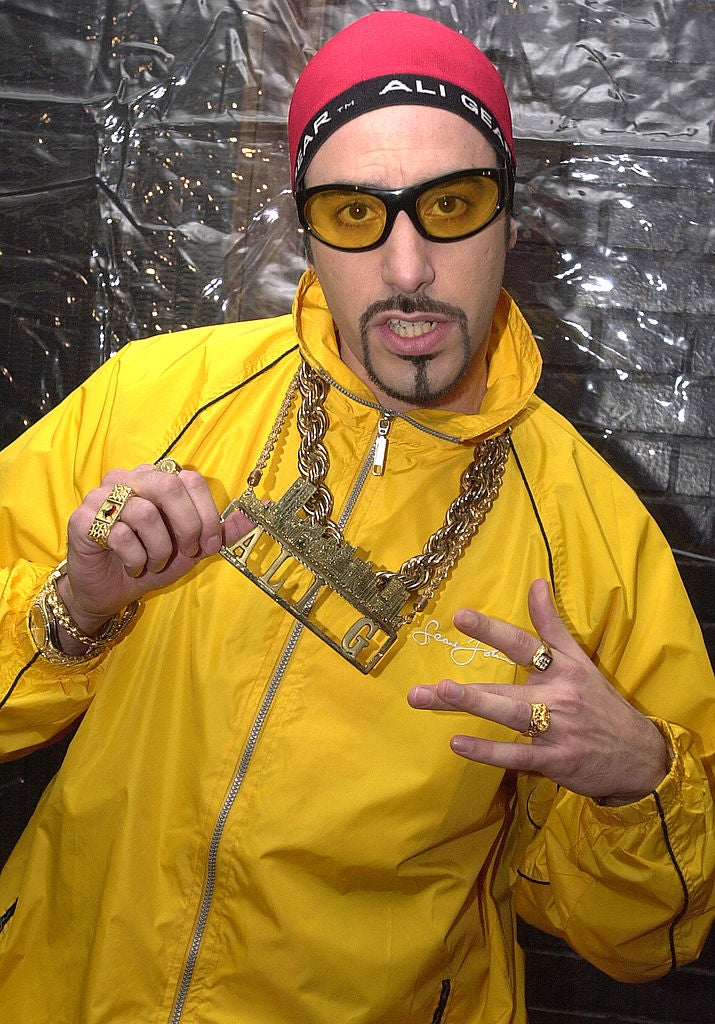The Independent's journalism is supported by our readers. When you purchase through links on our site, we may earn commission.
Borat 2: Sacha Baron Cohen survived ‘cancel culture’ by evolving instead of moaning
While his peers fret about being unable to tell jokes anymore, Sacha Baron Cohen has carefully avoided so-called ‘cancellation’ despite a dubious track record with race and stereotyping, writes Adam White


Your support helps us to tell the story
From reproductive rights to climate change to Big Tech, The Independent is on the ground when the story is developing. Whether it's investigating the financials of Elon Musk's pro-Trump PAC or producing our latest documentary, 'The A Word', which shines a light on the American women fighting for reproductive rights, we know how important it is to parse out the facts from the messaging.
At such a critical moment in US history, we need reporters on the ground. Your donation allows us to keep sending journalists to speak to both sides of the story.
The Independent is trusted by Americans across the entire political spectrum. And unlike many other quality news outlets, we choose not to lock Americans out of our reporting and analysis with paywalls. We believe quality journalism should be available to everyone, paid for by those who can afford it.
Your support makes all the difference.The “cancel culture” narrative promoted by the right-wing, if it existed, should have long ago led to Sacha Baron Cohen’s downfall. The British comic became a household name playing Ali G, a white, middle-class male appropriating black culture and hip-hop vernacular. It was a satire at the expense of men like Ali G, individuals trying on a persona they had no real right to adopt, but was also criticised for making hip-hop culture the butt of the joke, too – whether deliberately or inadvertently. Much of the same criticism trailed his later creations, the antisemitic, xenophobic Kazakh journalist Borat and the flamboyant gay fashion designer Bruno, both of whom have been accused of contributing to racism and homophobia as much as exposing them. And yet, for all his apparent sins, Baron Cohen is still here.
This week marks the release of Borat Subsequent Moviefilm, a belated sequel to the first Borat movie that is just as perceptive, cringeworthy and crude. That its arrival hasn’t been serenaded by controversy or “cancellation”, the perceived ruining that occurs in the wake of Twitter backlash, speaks to how successfully Baron Cohen has navigated treacherous waters. His approach has always tended to punch up – exposing the hypocrisy, ignorance and hatred in those wielding power, and expressing sympathy towards those lower down the social ladder haplessly parroting them. They’re mocked too, but through a compassionate lens.
In Borat Subsequent Moviefilm, Borat spends several days boarding with a pair of real-life conspiracy theorists who have no idea he is Sacha Baron Cohen. They are inherently funny in their eccentric ignorance about Covid-19 and Trump, but are also tragic figures – clueless pawns in a game of socio-political chess devised by the right-wing. “They’re ordinary folks who are good people, who have just been fed this diet of lies,” Baron Cohen told The New York Times last week. “They’re completely different to the politicians who are motivated by their own power, who realised that they can create fear by spreading these lies.” Social media, he says, is “the most effective propaganda machine in history”.
Last year, Baron Cohen condemned Google, Facebook, YouTube and Twitter for “deliberately amplifying … stories that appeal to our baser instincts and that trigger outrage and fear” via their algorithms. It was a rare act of celebrity activism directly targeting platforms usually off-limits for criticism, but also got to the root of Baron Cohen’s survival. Here is a comedian able to see the world from outside of himself, who is aware of politics, corruption and what truly matters, and then slips it all into his work. While it’s easy to be distracted by the absurdity of Republican politicians being tricked into advocating for three-year-olds owning guns (as South Carolina representative Joe Wilson did in Baron Cohen’s Who Is America? series last year), truth and horror always bubble under the surface.
Many of the comedy figures Baron Cohen became famous alongside have been unable to evolve their worldview. Ricky Gervais regularly froths at the mouth about “outrage mobs” censoring comedy; Dave Chappelle spent much of his recent Netflix special ranting about what he is and isn’t allowed to say; David Walliams and Matt Lucas, meanwhile, only seemed to realise their use of classist and racist stereotyping on Little Britain was a problem after the BBC pulled the show offline this summer amid a reckoning over blackface in comedy.

That few high-profile stars engulfed in recent social media storms have been truly “cancelled” is a mere technicality – JK Rowling’s books are still bestsellers, Woody Allen’s still getting his films financed, and many of us will have seen more of Laurence Fox’s face this year than we have our own. Yet so many comedians seem to be fretting about it, even while remaining gainfully employed, injecting every interview with claims that they can’t tell jokes anymore. Baron Cohen, meanwhile, seemingly spends his downtime in between projects reading and learning, rather than sitting in an expensive house getting increasingly pissed off about non-existent things.
Baron Cohen’s career has largely orbited around the same themes: surprise, embarrassment and public exposure of the hatred and indifference typically kept hidden. It’s arguable that they’ve become stale in recent years – Who Is America? felt slightly toothless in a climate where so many politicians are indifferent to public reckoning and chronically allergic to apologies, for example. But there’s something admirable about Baron Cohen’s interest in advancing the targets of his wrath.
Where once David and Victoria Beckham’s perceived ignorance felt ripe for mockery – Ali G notoriously interviewed the pair in 2001 – it now better resembles going after low-hanging fruit. Society’s most pressing concerns grew bigger, its villains more aggressively villainous, and Baron Cohen changed course. In effect, Baron Cohen subverted 2020 “cancellation” and the apparent extinction of outrageous comedy not by rejecting it or complaining about what a victim he has become, but by evolving and maturing. OK, based on the gleeful cringe of Borat Subsequent Moviefilm, maybe just the former.

Join our commenting forum
Join thought-provoking conversations, follow other Independent readers and see their replies
Comments